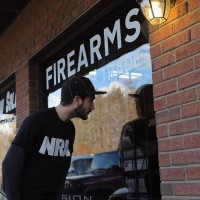Connecticut judge ruled on Thursday after family members questioned whether the gun companies aggressively macho advertising of rifles was irresponsible

The family members of Sandy Hook shooting victims will get to see the internal records of how gun companies market military-style rifles, a Connecticut judge ruled on Thursday.
It is the latest in a string of victories for the Sandy Hook families in their longshot lawsuit against the manufacturer, distributor and dealer of the rifle used in the December 2012 school shooting in Newtown, Connecticut.
The Bushmaster XM15-E2S rifle used to kill 20 first-graders and six educators was a legal weapon, and it was sold legally to Nancy Lanza, who was also killed by the shooter, her son Adam Lanza.
In the wake of the shooting, some family members of victims questioned whether the gun companies aggressively macho advertising of military-style rifles was irresponsible, and whether gun companies were intentionally targeting their product to troubled, violent young men like Lanza.
Thursdays ruling will give the families and their lawyers a chance to request internal documents and interviews with company officials to answer the question even if their lawsuit arguing that gun companies were negligent to sell military-style weapons to civilians is ultimately unsuccessful.
The gun companies targeted by the lawsuit had argued that they are not responsible for the criminal misuse of their products, and that a 2005 federal law specifically shields them from lawsuits like this one.
That 2005 Protection of Lawful Commerce in Arms Act, which Democratic presidential candidate Bernie Sanders supported, has become a flashpoint in the Democratic primary, with Hillary Clinton and family members of Sandy Hook families repeatedly hammering Sanders for his support of the gun industry.
Even Clintons campaign has said that the 2005 law makes it unlikely that the Sandy Hook families will win in court. The gun manufacturers have moved to strike the lawsuit, and they asked to delay the discovery process, in which the plaintiffs can request internal company documents and interviews with company officials, until after the court decides whether the case will go to trial.
But in Thursdays ruling, Connecticut superior court judge Barbara Bellis said she would not rule on that motion to strike until October 2016. In order to keep the case moving forward in a timely fashion, she ruled, the discovery process could not be delayed any further.
Adam Winkler, a second amendment expert at the University of Los Angeles School of Law, called Thursdays ruling an important one. Not only does it keep the plaintiffs case alive, it gives them a major victory in getting at the gunmakers corporate documents, he said.
The Sandy Hook case is clearly inspired by litigation against tobacco companies, he said. In those lawsuits, he said, things really changed when they got documents that showed the tobacco companies knew about the dangers of their products and hid those dangers from the public.
In this case, the families would like to show that the gun companies knew about the dangers of their product and yet continued to market them.
Bill Sherlach, whose wife Mary died at in the Sandy Hook shooting, said that understanding more about how gun companies market their products has been a central goal of the lawsuit. The families in the lawsuit have highlighted the military imagery in advertisements for Bushmaster rifles, and slogans like: Consider your man card reissued.
Sherlach said: You peel back the onion layer by layer, and you get to the core, and youre seeing: was there any concern whatsoever as to the safety aspect of what they were manufacturing?
Is there the stoking of a fire? Are you adding fuel to the fire of some of these predominantly angry white young men? Are you hitting their hot buttons to possibly go ahead and prove their manhood?
Sherlach said he was particularly interested in learning more about the internal communications between gun manufacturers and the marketing companies they work with. Were they paying no attention at all to who the most likely buyers of these things would be, or who are the fringe buyers? he said. Does that represent X% of their marketing and their sales?
Larry Keane, the senior vice-president for the National Shooting Sports Foundation, the firearms industry trade group, said the suggestion that gun companies purposefully market to disturbed young men is an absurd proposition and utterly false.
Keane said that the gun companies had nothing to fear from the discovery process. Before the federal shield law was passed in 2005, cities across the country sued gun companies, producing dozens and dozens and dozens of depositions and a warehouse full of documents, he said.
What they will find is absolutely nothing that the industry sells its guns in a lawful, legal manner, he said. The plaintiffs may not like the firearms, they may not like that they are sold, but they are a legal product in Connecticut.
Keane called Thursdays ruling disappointing. One of the purposes of the 2005 industry shield laws was to protect gun companies from the costs of litigation, he said. Instead, the gun company defendants in the suit will now have to pay for the costs of discovery, whether or not the case against them ultimately moves forward or not. That will be time-consuming and expensive, he said.
Waiting to begin the discovery process until after the court decided whether or not to strike the case would have seemed to be a more logical thing to do, Keane said.
This is a politicized litigation. It has no business being in the courtroom. The case should be dismissed, he said.
Its not for the courts to decide what products should or should not be sold, its a matter for the legislature.
Two gun manufacturers named in the lawsuit, Remington Arms and Bushmaster, are both part of Freedom Group, a family of companies that describes itself as the worlds leading innovator, designer, manufacturer and marketer of firearms.
Peter Duda, a spokesman for Cerberus Capital Management, which owns the Freedom Group, referred all comment to Remington. A spokeswoman for Remington, one of the gun companies named in the lawsuit, did not immediately respond to a request for comment.
The Connecticut state judge is obviously gaming the system for the benefit of plaintiffs, David Kopel, an attorney and prominent gun rights advocate, wrote in an email. As she is well aware, [the Protection of Lawful Commerce in Arms Act] forbids this lawsuit. Nevertheless, she is eager to give plaintiffs discovery, which the gun prohibition groups will likely seek to use in their propaganda campaigns.
Josh Koskoff from Koskoff, Koskoff & Bieder, one of the lawyers representing the families, said that the families had already waited a year and a half to begin the discovery process.
The defendants tried every tactic to avoid having to disclose a single document or answer a single question under oath, he said in a statement. Now that wait is officially over.
If the lawsuit survives the gun companies motion to strike, it will go to trial on 3 April 2018.
Read more: http://www.theguardian.com/us-news/2016/may/05/sandy-hook-victims-families-gun-manufacturer-records














